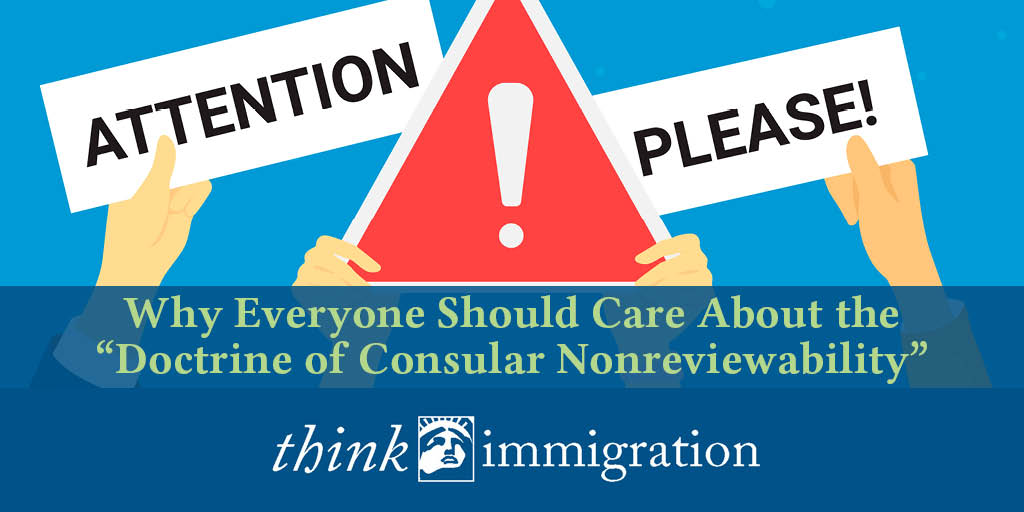As a part of our efforts to amplify the AILA Legislation Journal, authors Sabrina Damast and Eric Lee shared some insights from their latest article revealed within the November, 2022 version of the AILA Legislation Journal, “Consular Nonreviewability: Fifty Years Since Kleindienst v. Mandel” wherein they centered on this essential idea and its implications for a lot of households attempting to reunite.
Most readers in all probability haven’t heard of the “doctrine of consular non-reviewability” earlier than, and we admit that this clunky authorized time period doesn’t precisely leap off the web page.
However many may even be shocked to be taught that underneath this little-known doctrine, immigrants and even their US citizen members of the family are denied the suitable to legally problem the denial of visas by the manager department, with solely the rarest of exceptions.
To grasp how harmful this doctrine is, think about your self within the following state of affairs: You’re a US citizen with an undocumented partner who has utilized for a inexperienced card. Every part goes easily, your partner seems eligible, and because the final step within the course of, they fly to their dwelling nation for an interview on the US consulate. As an alternative of coming dwelling with a inexperienced card as anticipated, the State Division tells your partner they can not return to the US in any respect. The State Division doesn’t give a purpose, they merely say your partner would possibly interact in illegal exercise if allowed again into the US. You ask for clarification and obtain none, and since you have no idea the explanation for the denial, you haven’t any strategy to disprove it.
What are you able to do to unite your loved ones and produce your partner again dwelling? Most People will reply instinctively: “I’ve the suitable to my day in courtroom.”
However in keeping with the doctrine of consular non-reviewability, you don’t. The doctrine says that courts can not assessment visa denials to make sure their constitutionality, so long as the denial was “facially respectable and bona fide.” This time period comes from Kleindienst v. Mandel, a Supreme Courtroom case issued 50 years in the past this yr which is the main target of our article within the November, 2022 edition of the AILA Law Journal.
The “facially respectable and bona fide” customary is a really low bar which the State Division argues it might meet even when the visa denial was improper and even when the division has no factual purpose for the denial.
To our data, solely as soon as has a federal courtroom issued a broadcast resolution ruling that the federal government’s denial of a visa didn’t meet this “facially respectable and bona fide” customary. There’s hope—this resolution was latest: the Ninth Circuit’s October 2022 resolution in Muñoz v. State Division. In one other latest case, Khachatryan v. Blinken, the Ninth Circuit dominated in opposition to an immigrant and his US citizen relative however expanded the methods wherein plaintiffs can receive judicial assessment by displaying the State Division acted in “dangerous religion.”
The doctrine of consular non-reviewability obtained transient media consideration in 2017 and 2018 when the Trump administration relied on it to defend its blanket choices barring journey from numerous international locations, and in the long run the Supreme Courtroom upheld Trump’s bans. Its origins lie within the Chinese language Exclusion Circumstances, the place most of the similar justices who upheld “separate however equal” racial segregation in Plessy vs. Ferguson dominated that the federal government’s energy to exclude immigrants was at a Most as a result of Chinese language immigrants constituted an “Oriental invasion” that posed “a menace to our civilization.”
We really feel this doctrine deserves far broader consideration at present, not least due to the unknown variety of households who stay separated due to unjust visa denials who’re nonetheless ready—generally years—for his or her day in courtroom.
These are extraordinarily perilous instances for democracy, and all of us must be involved about areas of the regulation which grant the president the ability to behave with out judicial assessment. We argue on this article that it’s excessive time for a paradigm shift relating to the outdated doctrine of consular non-reviewability.
*****
AILA members, don’t neglect to entry your FREE digital copy of the AILA Law Journal on aila.org.
Not an AILA member, however concerned about studying extra? Please access our member information here.

